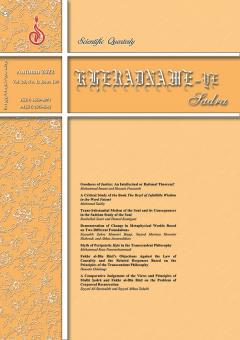Goodness of Justice: An Intellectual or Rational Theorem?
Subject Areas : Studies on Islamic philosophy and wisdomMohammad Imami 1 , حسین فرزانه 2
1 - Jurisprudence and the Fundaments of the Islamic Law Department, Razavi University of Islamic Sciences, Mashhad, Iran
2 - PHD Condidate, Jurisprudence and the Fundaments of the Islamic Law, Razavi University of Islamic Sciences, Mashhad, Iran
Keywords: goodness of justice, moral propositions, intellectual, badness of cruelty, evident propositions, rational,
Abstract :
“Justice is good” and “cruelty is bad” are two of the most frequently used principles and propositions in various disciplines. Mutikallimun consider these two propositions to be rational, primary necessary, evident, certain, and needless of reasoning. However, some philosophers deny their evidence and certainty and consider them as generally accepted propositions that bear no truth except for conforming to thinkers’ views. Certainty in relation to these two propositions means believing in the correctness of their use in arguments and production of scientific results, and indemonstrability refers to their dialectical application. Some believe that the indemonstrability in the interpretation of such propositions would undermine the basis of moral propositions. The question here is why there is so much controversy about these two apparently evident propositions. The findings of this descriptive-analytic study reveal that the solution must be found in distinguishing between “intellectual goodness” and “rational goodness”. When these two propositions are considered as individual intellectual propositions, they are hypothetical and genetic judgments; however, at a rational social level, they are evident and, of course, mentally posited and, unlike the general view of logicians, they must be viewed as certain propositions (not as generally accepted ones). In addition, some statements such as “They have no basis but popularity”, which are used by some philosophers and logicians about the two propositions, are not used to deny their reality. Rather, they are intended to deny the evidence and necessity of these two propositions in intellectual analyses. Thus, no damage is done to their support for moral propositions.
قرآن كريم.
ابنسينا (1379) النجاة، تصحيح محمدتقي دانشپژوه، تهران: دانشگاه تهران.
ابنسينا (1381) الاشارات و التنبيهات، قم: بوستان كتاب.
اصفهاني، محمدحسين (1374) نهاية الدراية في شرح الكفاية، قم: سيدالشهداء.
حائري، مهدي (1361) كاوشهاي عقل عملي، تهران: مؤسسة تحقيقات و مطالعات فرهنگي.
ذريّه، محمدجواد؛ بيدهندي، محمد؛ شانظري، جعفر (1396) «واكاوي معناشناختي عقل نظري و عقل عملي از نظرگاه ملاصدرا»، خردنامه صدرا، شمارة 90، ص108ـ91.
سبحاني، جعفر (1412ق) الالهيات علي هدي الكتاب و السنة و العقل، قم: المركز العالمي للدراسات الاسلامية.
سبحاني، جعفر (بيتا) بحوث في الملل و النحل، قم: مؤسسة نشر اسلامي.
سبزواري، ملاهادي (1372) شرح الاسماء الحسني، تهران: دانشگاه تهران.
سبزواري، ملاهادي (1376) رسائل حكيم سبزواري، بكوشش سيدجلالالدين آشتياني، تهران: اسوه.
طباطبايي، سيدمحمدحسين (1364) اصول فلسفه و روش رئاليسم، تهران: صدرا.
طباطبايي، سيدمحمدحسين (1428 ق/ الف) الانسان و العقيدة، قم: باقيات.
طباطبايي، سيدمحمدحسين (1428 ق/ ب) مجموعة رسائل العلامة الطباطبائي، تحقيق صباح ربيعي، قم: باقيات.
طباطبايي، سيدمحمدحسين (1999 م) الرسائل التوحيدية، بيروت: النعمان.
طباطبايي، سيدمحمدحسين (بيتا) حاشية الكفاية، قم: بنياد علمي و فكري علامه طباطبايي.
طوسي، نصيرالدين محمد (1403ق) شرح الاشارات و التنبيهات (مع المحاكمات)، قم: دفتر نشر الكتاب.
عبداللهي، مهدي (1394) «تقريري از واقعنمايي آموزههاي اخلاقي بر پايه تحليل فلسفي فعل اخلاقي»، جاويدان خرد، شمارة 28، ص102ـ85.
عليدوست، ابوالقاسم (1386) فقه و عرف، قم: پژوهشگاه فرهنگ و انديشه اسلامي.
فياض لاهيجي، عبدالرزاق (1372) سرمايه ايمان در اصول اعتقادات، تصحيح صادق لاريجاني، تهران: الزهراء.
كليني، محمد بن يعقوب (1407ق) الكافي، تهران: دار الكتب الاسلاميه.
لاريجاني، صادق (1386) «نظريهيي در تحليل الزامات اخلاقي و عقلي»، پژوهشهاي اصولي، شمارة 7، ص 234ـ 209.
محيطي اردكان، حسن (1394) «توجيه آموزههاي اخلاقي بر مبناي شهرت»، معرفت اخلاقي، شمارة 17، ص 24 ـ5.
محيطي اردكان، حسن (1397) «بررسي نقش عرف عقلا در وضع آموزههاي اخلاقي، با تأكيد بر ديدگاه محقق اصفهاني»، پژوهشنامه اخلاقي، شمارة 42، ص34ـ25.
مظفر، محمدرضا (1366) المنطق، قم: اسماعيليان.
مظفر، محمدرضا (1375) اصول الفقه، قم: اسماعيليان.
ملاصدرا (1382) الحكمة المتعالية في الاسفار الاربعة، ج9، تصحيح و تحقيق رضا اكبريان، تهران: بنياد حكمت اسلامي صدرا
ملاصدرا (1383) الحكمة المتعالية في الاسفار الاربعة، ج1، تصحيح و تحقيق غلامرضا اعواني، تهران: بنياد حكمت اسلامي صدرا.
مهريزي، مهدي (1376) «عدالت بمثابه قاعدة فقهي»، نقد و نظر، شمارة 10و11، ص197ـ184.
نراقي، احمد (1378) معراج السعادة، قم: هجرت.


